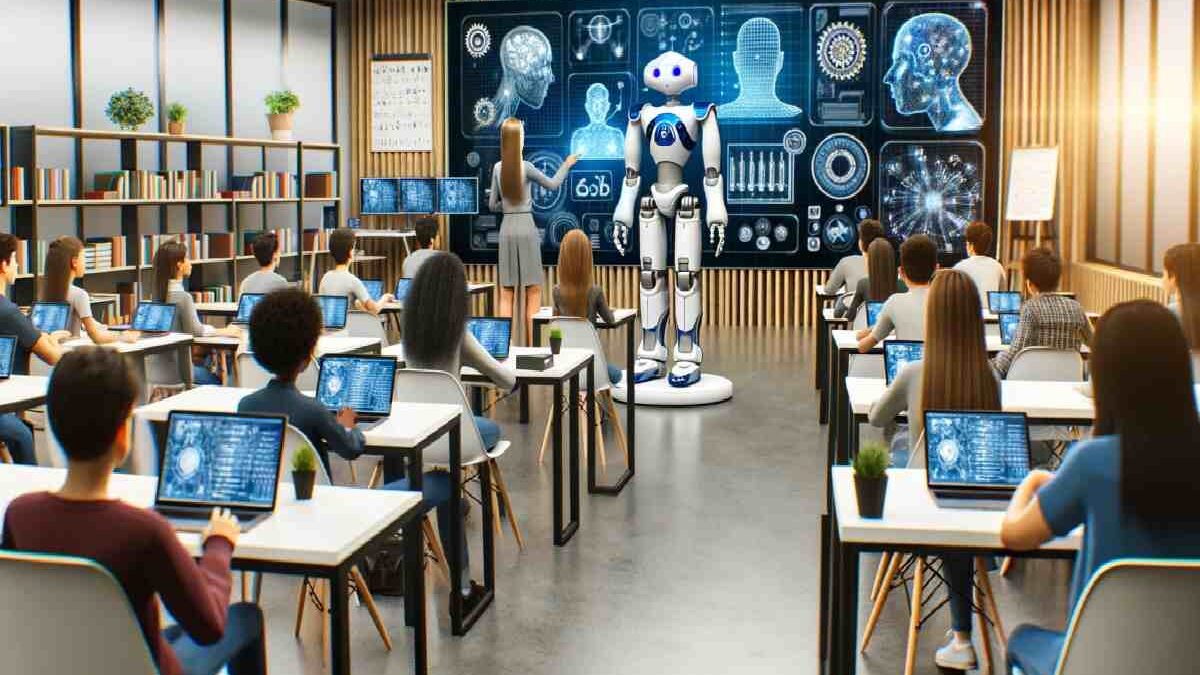Gradually, artificial intelligence is taking over In India. By the end of 2025, it is estimated to be worth $8.3 billion (Rs. 68,990 crores). After that, it is expected to keep growing by about 27.86% every year until 2030.
This growth presents unique opportunities for working professionals like you. By learning AI skills, you can boost your career by finding better high-paying jobs in the future.
Have you realised the need to upskill yet? A recent study shows that the demand for courses on Generative AI has grown by 195% (in the first three months of 2024). This clearly shows that more and more professionals are interested in learning about AI and trying to secure better career opportunities in the future.
Let’s gain more clarity and understand in detail the rise of AI education for professionals in India.
Table of Contents
Major initiatives to support AI education
A study shows that about 62% of Indian professionals believe their career growth depends on their comfort level with AI. Thus, to promote AI education, the Indian government has started various initiatives. Let’s check them out:
1. Centre of Excellence (CoE) in AI for education
In the Union Budget 2025-26, the Indian government set aside Rs. 500 crore to create a Centre of Excellence (CoE) in AI for education. This centre will improve education using AI-powered tools and techniques. The main goal is to help students and teachers develop AI skills that match industry needs.
Here, one of the key areas will be “personalised learning”. It will lead to the development of customised study plans based on a student’s progress. Additionally, AI will be used to develop smart content, such as:
- Automated study materials
and
- Virtual classrooms
2. National Centres of Excellence for Skilling
The government is setting up five National Centres of Excellence for Skilling. These centres will provide training to professionals in AI and other emerging technologies.
One of the main objectives of these centres is to design courses that match industry requirements. This will help professionals learn the latest AI skills companies are looking for.
Additionally, this initiative will create a structured certification system. It will validate the skills of professionals who complete these courses. By establishing these centres, the government is trying to build a workforce that is ready for AI-driven industries.
3. Global collaborations and launching learning platforms
The Indian government is now partnering with other countries and organisations to improve AI education. Primarily, they are learning from countries like Finland and Singapore, which have successfully integrated AI into their education systems.
Another major focus is on making AI learning accessible to all. For this purpose, platforms like DIKSHA and SWAYAM have been launched. They are now offering AI online courses and study materials in local languages.
Using these platforms, professionals from different backgrounds can learn AI skills at their own pace.
4. Year of AI (2025)
In 2025, the All India Council for Technical Education (AICTE) will focus on AI education across India. They have named 2025 the “Year of AI” to highlight its importance in education.
This initiative will bring AI-related subjects and courses into more than 14,000 colleges and institutions. This is expected to benefit around 4 crore students.
They will now get a chance to learn AI skills through new courses and by working on real-world projects.
Upskilling opportunities for professionals
As per recent research, both technical and non-technical professionals are increasingly enrolling in AI courses. Particularly, there has been a 117% surge in participation by non-tech professionals over the past year.
As a professional, you can also upskill yourself through these programs:
1. Pradhan Mantri Kaushal Vikas Yojana (PMKVY) 4.0
PMKVY 4.0 is a government program that provides skill training to professionals. This version of the scheme focuses on teaching advanced skills in areas like:
- Artificial Intelligence (AI)
- Machine Learning (ML)
- Natural Language Processing (NLP)
- Cybersecurity
- Robotics
It includes more than 400 new courses to ensure professionals learn the latest industry-relevant skills. Moreover, a key feature of this program is on-the-job training. This allows you to understand how AI and other technologies are used in real work environments.
2. Microsoft’s AI skilling initiative (ADVANTA(I)GE INDIA)
Besides the Indian government, Microsoft has also launched a program to train 20 lakh people in India with AI skills by the end of 2025. This initiative is called ADVANTA(I)GE INDIA and is part of Microsoft’s effort to prepare professionals for AI-related jobs.
This program was launched after a recent Microsoft survey found that 90% of company leaders in India believe their employees need new skills to work with AI. However, at the same time, 78% of employees feel they don’t have the AI skills needed for their jobs.
To solve this, Microsoft’s program will focus on training people in smaller cities (Tier 2 and Tier 3) and rural areas.
3. National Programme on AI by NASSCOM
The National Association of Software and Service Companies (NASSCOM) has introduced a comprehensive program to increase the AI talent pool in India. This initiative focuses on training individuals in AI to meet the growing demand in the industry.
Due to these efforts, NASSCOM projects that the AI talent pool in India will grow from approximately 6 lakh professionals to over 12.50 lakhs by 2027 at a CAGR of 15%. To access the AI learning courses, you can purchase the latest laptops and gadgets from online marketplaces at steep discounts.
Conclusion
Nowadays, AI is being used in multiple industries like retail, healthcare, banking, and NBFCs. Due to this increased AI adoption, you, as a professional must upskill to stay competitive in the job market.
You can easily learn AI and its practical usage by taking part in initiatives like PMKVY 4.0, Microsoft’s ADVANTA(I)GE INDIA, and NASSCOM’s AI program. Additionally, you can opt for AI online courses offered by government-run online platforms, DIKSHA and SWAYAM.

